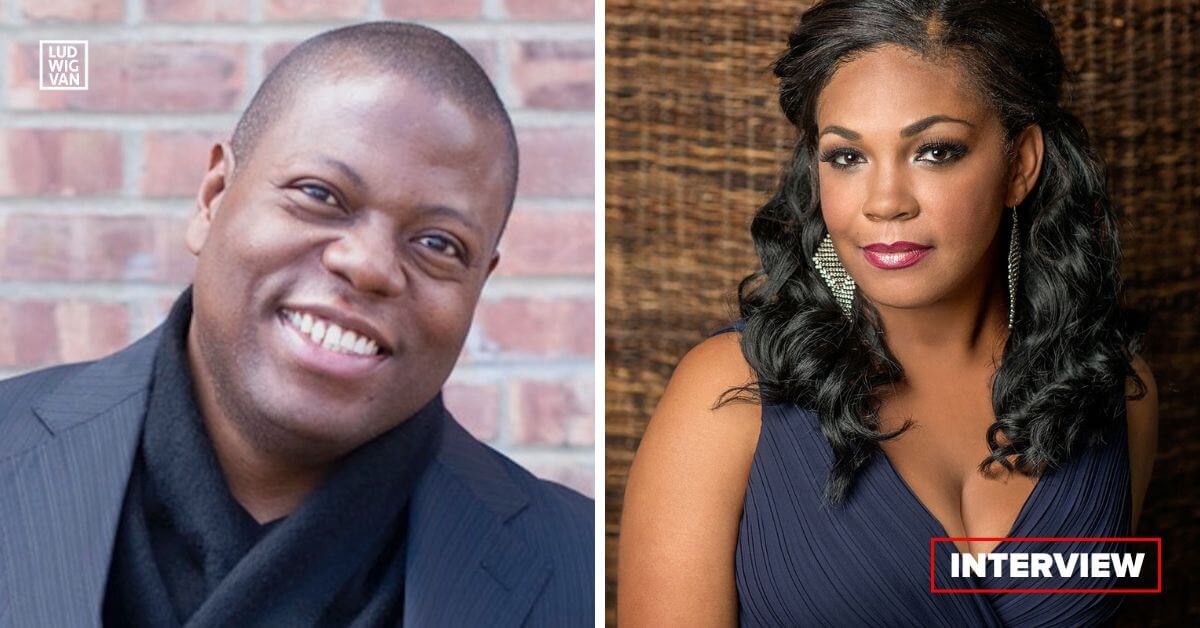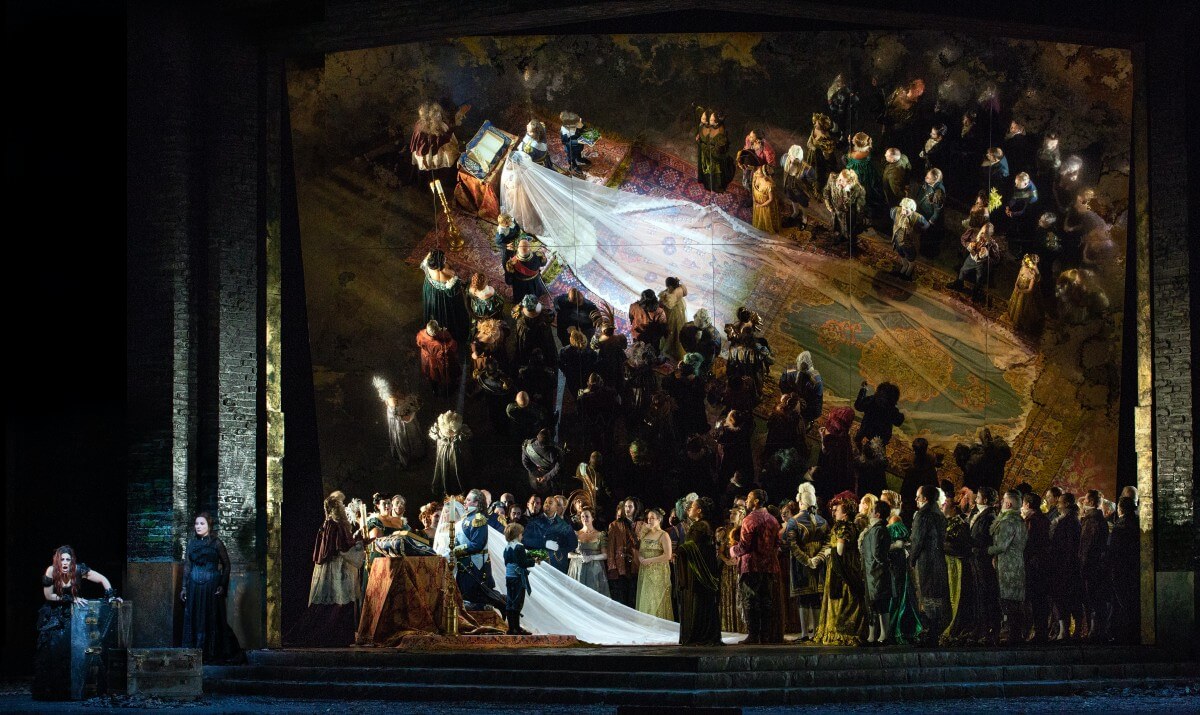
Toronto audiences will be offered a rare opportunity with the Canadian Opera Company’s very first production of Cherubini’s Medea. The notoriously challenging work stars soprano Sondra Radvanovsky in the title role, and remounts director Sir David McVicar’s staging of 2022.
The opera is a co-production of the Metropolitan Opera, Greek National Opera, Canadian Opera Company, and Lyric Opera of Chicago. Matthew Polenzani co-stars at Giasone, with Zoie Reams as Neris, Janai Brugger as Glauce, and Alfred Walker as King Creonte.
“It’s a unique opportunity to see an opera that’s rarely done,” says baritone Alfred Walker.
The Opera
Luigi Cherubini premiered Medea on March 13, 1797 in Paris. The opera was based on Euripides tragedy of the same name, and had a half-hearted initial reception that led to it languishing in relative obscurity for decades, despite a translation into German and a handful of German productions. Originally written in French, an Italian version has become the standard since the 20th century.
A long lost aria was discovered by researchers using x-rays to reveal areas of the original manuscript that had been blackened out. Performed sporadically over the first two centuries, its first major revival came at the hands of legendary soprano Maria Callas, who took on the title role in 1953, and made it one of her signature pieces through the 1960s.

The Story
“If you’re looking for a happy ending, this is not the opera for that,” notes Janai Brugger. Overall, it’s an intense and emotional story. “There’s a lot of tension between all the characters.”
In ancient Corinth, preparations are being made for the wedding of Giasone (Jason, he of the Argonauts) and the princess Glauce, but all is not as happy as it seems. Medea, a sorceress who went to great lengths to ensure Giasone’s victory and return to the throne, is on her way for a reckoning. Giasone assures Glauce that he’s no longer interested in Medea, but the sorceress will go to extreme lengths to make sure if she can’t have him, he will never again live in peace.
It’s as bloody and vengeful as Greek mythology gets.
Alfred Walker & Janai Brugger
Baritone Alfred Walker portrays King Creonte, Glauce’s father, and the attempted peacemaker between the vengeful Medea and the wedding party. Soprano Janai Brugger portrays Glauce, the unlucky princess of Conrinth who is preparing for her wedding to Giasone as Medea arrives to darken the day.
Walker is a native of New Orleans, and a graduate of Dillard University, Loyola University, and the Metropolitan Opera Lindemann Young Artist Program. He’s won several awards, including the George London Foundation, Palm Beach Opera Competition, Houston Opera Studio’s Eleanor McCollum Competition, and the Sullivan Foundation career grant.
Soprano Janai Brugger was the 2012 winner of Operalia and of the Metropolitan Opera National Council Auditions, and made her debut with the Metropolitan Opera the same year. Since then, she has performed with Palm Beach Opera, the Los Angeles Opera, Lyric Opera of Chicago, and many other companies across the United States and Europe. In 2022, she made her TV debut with on the HBO series Lovecraft Country.
The Interview
Singing King Creonte
Baritone Alfred Walker sang the role of King Creonte in France several years ago, perhaps ironically using the Italian version. “I know where the bodies are buried, I know the piece,” he says. “It’s been interesting. I’m a much different singer now.”
Returning to the role was a process of its own. “I like to think, because I work hard at this, that I’m constantly improving,” Alfred says. It means coming back to it with new skills. “To be freer.”
The role of King Creonte is one that requires a certain sense of presence. “I think I bring that to it,” he says. “Being older, I have more nobility,” he adds. Life experience adds to dramatic skills. “When you’re younger, you’re constantly trying to impress people with your voice. When you get older, it becomes a different process.”
Age, as he notes, while it’s feared by many singers, can add different dimensions to your voice in terms of subtleties and character definition. “My voice has gotten, over time, deeper and more complex.”
His take on the role is changed, and his analysis of the role. “I think […] the strength to me is in the recitatives – to really make something of that,” he says. The set arias are less crucial to his role.
“The music is pretty,” Alfred adds. As he explains it, the recitatives impart information, but as a singer, you get a chance to really make something of the language, and what is being said. “I think that’s very important to this opera.”
The role offers welcome challenges. “It’s different than anything I’ve ever done,” Alfred says. “I don’t know anything quite like it.”
The Production
Soprano Janai Brugger, singing the role of Glauce, was part of the original cast for the Met production. “Yes, I did it for the first time two years ago for the Met opening season. It’s kind of nice to bring back the same production.”
Sir David McVicar’s production is a revival of the opera. “He’s a brilliant, brilliant director,” says Janai.
Janai has worked with McVicar on a few productions, calling his scope grand and detail oriented. “It’s dark. You feel like you’re in an underworld.” Set design adds to the effect. “It kind of looks like we haven’t seen the light of day.” A mirrored backdrop reflects and augments what’s happening on the stage, adding another dimension visually. “It’s so cool.” The costumes are elaborate. “I get to wear this 2-foot train, this veil [for the wedding scene].”
“David’s vision is always thinking outside the box.”
Sondra Radvanovsky’s portrayal of Medea back in 2022 made headlines. “It was my first time working with her. She is just one of the most humble, down to earth human beings I’ve worked with. I was totally fan girling,” Janai says. “She is a beast in this role.”
For Alfred, it will be the first time he’s worked with Radvanovsky. “This is our first opera together.”
Challenging Roles
Sondra’s role of Medea is legendary for its difficulty, but that level of technical prowess extends to all the roles.
“It’s very challenging,” Alfred says of King Creonte’s role. As he explains, it’s not quite for a bass, and it’s not quite for a baritone. “You have to have a long voice to do it,” he says. “It has its challenges. It kind of hangs in the cracks of the voice, and yet, you have to make a big, dramatic sound,” he adds.
“My part is very challenging. It’s not super long, but it’s very challenging.”
Along with the typical feelings of a father, Creonte softens from his original stance of anger and hostility. He’s seduced by Medea’s grief and personality. “The role has a big range to it. It’s interesting to show that. It’s interesting to play kings,” he says. It’s about looking for the fallible human inside the ruler. “That’s always interesting to me.”
The roles are demanding both technically and emotionally. “It sounds easy, but it is not easy by any means,” Janai says. Her opening aria sets the bar. “I have to pace myself to make it to the end,” she adds, noting that the part sits right at the top of the soprano range.
How does she handle the physical and mental demands of the role? “Stamina is a huge thing, and pacing. Staying as grounded as possible,” she says. “It’s probably one of the most challenging roles I’ve ever sung.” It’s also, as she notes, a good role to take on at this juncture of her career, and to showcase in her repertoire.
While the titular Medea is clearly the centre of the story, her role has to be balanced by strong roles in the rest of the cast, and Glauce, in particular. Janai says she was influenced in part by an interview with Sondra where she spoke about Medea, and how she wanted audiences to remember that she was human, and not only an evil sorceress.
“Glauce is very smart and aware,” she says of her character. “From the beginning, she is very unsettled. She knows Medea is coming for her.”
In the story, at first, those around her try to reassure Glauce, and get her in the mood for a happy wedding. “She has a split second of relief,” she says.
Glauce as a character has little control over what is happening. But, Janai doesn’t see her as purely a helpless victim.
“She’s strong. She’s not a damsel in distress,” she says. She sees her as being a character who’s perceptive and aware — not that it gets her anywhere. “She’s very aware of the danger, but nobody takes her seriously,” Janai adds. “She suffers for it.”
From Glauce’s perspective, it’s a true tragedy. She’s simply been dragged into a situation by association.
Toronto Performance
“I’m looking forward to it,” Alfred says. “It’s my first time at the COC.”
“Audiences are in for a real treat, in spite of the heaviness of the content. It’s really gripping,” Janai adds.
- Find out more details about the performances May 3, 5, 9, 11, 15, and 17, and tickets, [HERE].
Are you looking to promote an event? Have a news tip? Need to know the best events happening this weekend? Send us a note.
#LUDWIGVAN
Get the daily arts news straight to your inbox.
Sign up for the Ludwig Van Toronto e-Blast! — local classical music and opera news straight to your inbox HERE.
- PREVIEW | SUMMER OPERA LYRIC THEATRE Presents Handel’s Xerxes, Mozart’s Idomeneo & Puccini’a La Boheme July 26 To August 4 - July 26, 2024
- PREVIEW | YENSA Festival V.2 Offers Black Flames Performances & Other Ways To Celebrate Black Women In Dance - July 25, 2024
- PREVIEW | Canadian Talent Conspicuous In The Met: Live In HD 2024-25 Season - July 25, 2024



